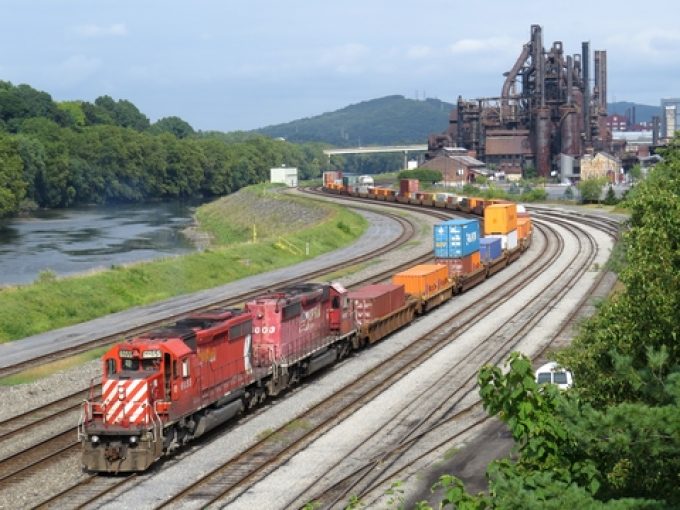News in Brief Podcast | Week 51 | Airfreight peak, management shuffles and automation impasse
In this episode of The Loadstar’s News in Brief Podcast, host and news reporter Charlotte Goldstone ...
FDX: ABOUT USPS PRIVATISATIONFDX: CCO VIEWFDX: LOWER GUIDANCE FDX: DISRUPTING AIR FREIGHTFDX: FOCUS ON KEY VERTICALFDX: LTL OUTLOOKGXO: NEW LOW LINE: NEW LOW FDX: INDUSTRIAL WOESFDX: HEALTH CHECKFDX: TRADING UPDATEWMT: GREEN WOESFDX: FREIGHT BREAK-UPFDX: WAITING FOR THE SPINHON: BREAK-UP ALLUREDSV: BREACHING SUPPORTVW: BOLT-ON DEALAMZN: TOP PICK
FDX: ABOUT USPS PRIVATISATIONFDX: CCO VIEWFDX: LOWER GUIDANCE FDX: DISRUPTING AIR FREIGHTFDX: FOCUS ON KEY VERTICALFDX: LTL OUTLOOKGXO: NEW LOW LINE: NEW LOW FDX: INDUSTRIAL WOESFDX: HEALTH CHECKFDX: TRADING UPDATEWMT: GREEN WOESFDX: FREIGHT BREAK-UPFDX: WAITING FOR THE SPINHON: BREAK-UP ALLUREDSV: BREACHING SUPPORTVW: BOLT-ON DEALAMZN: TOP PICK

Last week’s meetings between the Teamsters union (TCRC) and Canadian National Railway (CN) were abandoned less than halfway through, as the parties refuse to see eye-to-eye.
Rail workers at CN and Canadian Pacific Kansas City (CPKC) were set to strike on 22 May, but a request from the government for the Canada Industrial Relations Board (CIRB) to “review if a strike could endanger public safety” put this on pause.
The CIRB process does not impact continued bargaining, and last week TCRC and CN planned three days of meetings with the participation of the Federal Mediation and Conciliation Services.
However, the union announced on Friday: “Unfortunately, after only the first day of meeting, we could only realise that CN had no intention of discussing or even considering our demands… Given this reality, it was decided not to continue for the other two days.”
The union said it offered both CN and CPKC two weeks of staggered negotiations, as “a sensible solution that would minimise disruptions and allow all parties to address their concerns in a more structured and productive manner”.
“The move would avoid simultaneous work stoppages at CN and CPKC, significantly reducing the economic impacts from any disruptions to the supply chain from a strike or lockout,” it explained.
But the union’s proposal was rejected by both train operators.
TCRC president Paul Boucher said: “CN and CPKC’s rejection of this proposal is a clear indication of how little they care about the economy and the supply chain, as well as their unwillingness to negotiate. Quite frankly, they are using multinational corporations, the Canadian public and North American supply chains as pawns to further their greed.”
However, CN announced it offered TCRC to enter “binding arbitration”, that would see a mutually agreed independent arbitrator evaluate the demands of each side and decide on the terms of the new collective agreement.
But this process was rejected by the union.
TCRC said: “The employer’s actions demonstrate more and more clearly that CN has no intention of reaching a negotiated agreement with the union. In fact, CN seems to be trying by all means to remove the union’s right to strike and, instead, rely on an arbitration process instead of taking its responsibilities and negotiate in good faith.”
Mr Boucher added: “A work stoppage has never ever been our goal. Our members at both carriers simply want a fair and equitable collective agreement – one that does not compromise their quality of life or their safety. CN and CPKC are standing in the way of that.”
The union has made clear it will strike at its earliest opportunity, pending the CIRB decision, but it must give 72-hours’ notice. CN advised that a work stoppage was “unlikely” before mid-to-late July, but due to the unknown CIRB timeline, nothing was certain.
The CIRB set a 14 June deadline for stakeholders to submit arguments on whether the rail service can be deemed ‘essential’, prompted by its cruciality in moving propane, food products and other important commodities.
In the first round of CIRB feedback, CN, CPKC and the TCRC argued that rail services should not be deemed essential, and recalled a previous dispute between CN and TCRC where a similar conclusion was reached.
Looking for a quick recap of last weeks supply-chain news? Listen to The Loadstar Podcast News in Brief:
Comment on this article